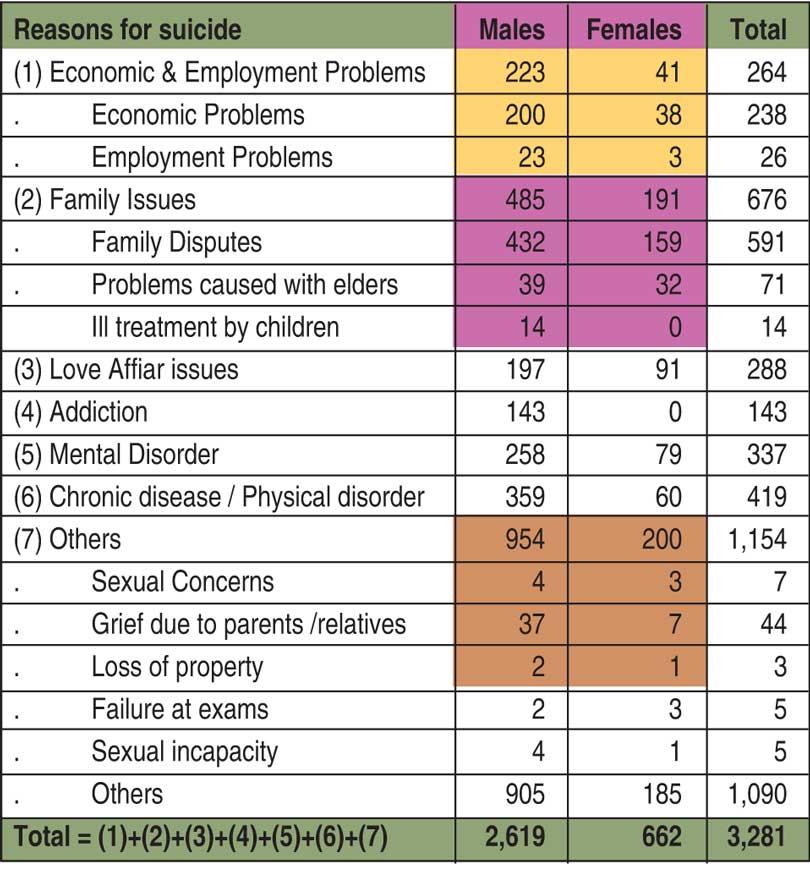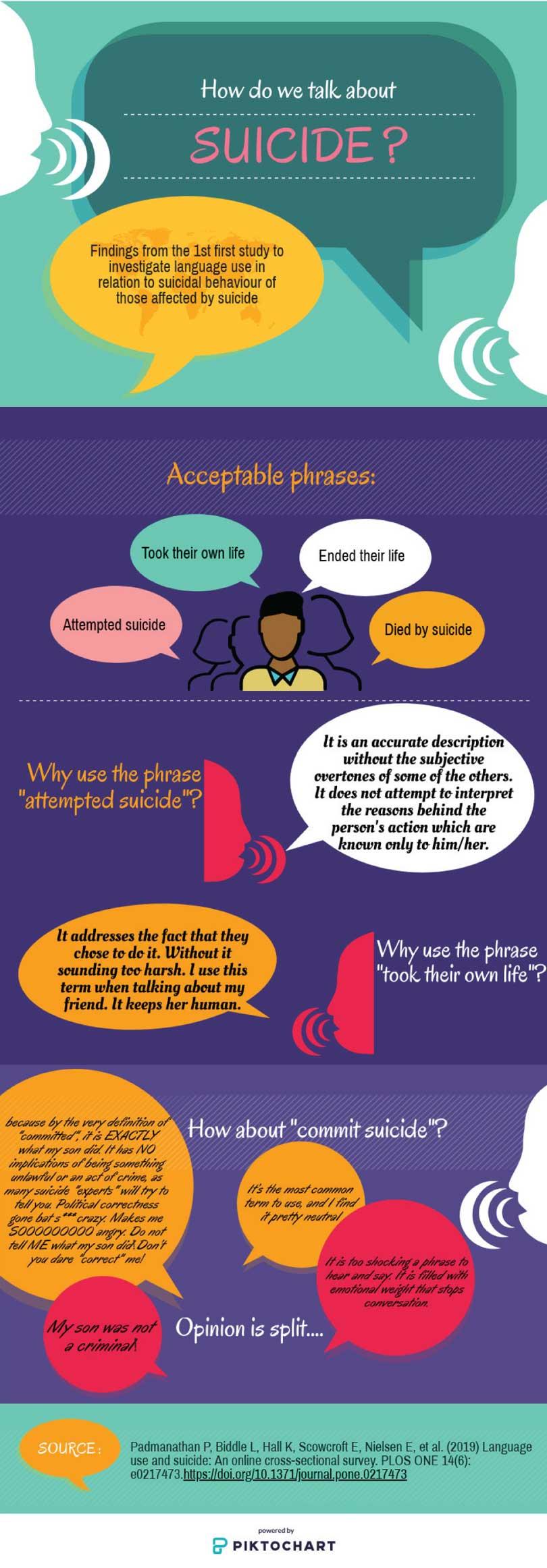Reply To:
Name - Reply Comment
Last Updated : 2024-04-19 00:03:00

 We all have good and bad days. But for some, a repetitive process of bad encounters, challenging life decisions and stressful events would be a burden on life. A person who has given up on life expresses various behaviours and emotions, mostly which are unnoticed by those around them. In most instances, people feeling suicidal have no one to talk to. Even if they do, others may not take them seriously. A common misunderstanding is that they are being judged as attention-seekers, while on the other hand, those who listen to them would try to sympathise or compare their situations with those of others. In all these instances, the suicidal person feels even more vulnerable and ‘encouraged’ to make an attempt. This is why a collective effort is required to put an end to suicide.
We all have good and bad days. But for some, a repetitive process of bad encounters, challenging life decisions and stressful events would be a burden on life. A person who has given up on life expresses various behaviours and emotions, mostly which are unnoticed by those around them. In most instances, people feeling suicidal have no one to talk to. Even if they do, others may not take them seriously. A common misunderstanding is that they are being judged as attention-seekers, while on the other hand, those who listen to them would try to sympathise or compare their situations with those of others. In all these instances, the suicidal person feels even more vulnerable and ‘encouraged’ to make an attempt. This is why a collective effort is required to put an end to suicide.
Today, on World Suicide Prevention Day, the Daily Mirror takes a closer look at why those around a suicidal person and society at large have a bigger role to play in putting an end to this complicated social phenomenon.
Mindfulness could help control emotions : Kumudini
“The biggest issue now is social media and the smart phone”, said Sumithrayo Chairperson Kumudini De Silva. “Everyone is engrossed with various gadgets and even in a crowd you’re isolated. So we don’t notice the people around you. Nobody would notice a behavioral change in another person. Even the person feeling suicidal doesn’t want to open up because we all have an image. We like to maintain it even with our friends and family. If you’re really concerned about a person you need to spend at least 5-10 minutes of quality time with them. You should ask them what the matter is. Sometimes we don’t take it seriously. We ask them out for a coffee and that way we try to fix it on the surface. It’s the feeling they are having and they want to talk it out. According to our society we always keep things to ourselves and it’s a taboo to talk about most personal issues. There’s much red tape within your family itself. So people keep bottling up emotions within. It’s not a weakness to open up, it actually shows a strength in their character, to reach out and talk to someone. It’s not easy to reach out, to talk about your inner feelings etc. Another issue is the fact that we haven’t accepted that we should go for counselling in our society.”

“We ask them out for a coffee and that way we try to fix it on the surface. It’s the feeling they are having and they want to talk it out”
Over the years, Sumithrayo has progressed establishing 10 centres and two rural programmes in North Western and Southern Provinces in over 120 villages. Befriending is also done at school level and they carry out many outreach programmes. Some approaches include speaking to mothers at the Lady Ridgeway Heartbeat Home who come from faraway places. This is done twice a week while they also visit the Victoria Home once a week and the Helpage Day Care Centre in Ratmalana. Although there are many other programmes being lined up there’s a dearth of volunteers. According to De Silva, there are around 10-12 regular volunteers engaged in the outreach programme. One of the concerns raised was that the number of calls have increased.
She also stressed on how mindfulness could help in the process of controlling your emotions. “If you know the root causes of why you feel sad and start addressing them, it could help most people who want to attempt suicide to a greater extent.”
Society should react negatively to vectors causing suicide : Dr. De Silva
Speaking on the topic, Dr. Jayamal De Silva, Consultant Psychiatrist at Colombo South Teaching Hospital, Kalubowila and senior lecturer in Psychiatry, Faculty of Medical Sciences, University of Sri Jayawardenapura said that the society should react negatively to vectors causing suicide. “Today we see suicide scenes in most music videos and artistic creations. These escalate the tendency for those who want to attempt suicide. It in turn sets a precedent for the ‘copycat syndrome.’ Therefore the society has a huge role to play in this process.”
Life is unpredictable in this profession : Kumari
At Sumithrayo, a person in need is befriended and this is quite different to counselling and diagnosing symptoms. “Therefore, we have an indirect approach in getting to know the person and his troubled life,” says B.M. Thakshila Kumari, a rural programme officer in Panduwasnuwara. “We need to be flexible with whatever that we face. You need to empathise and not sympathize and this is what is unique about the befriending technique. It is a case of helping when someone feels low. We need to accept other people for who they are. If the other person doesn’t like to talk about it we shouldn’t force him or her. It’s the caller who starts the story and ends it. We haven’t told anyone not to commit suicide. Suicide is a huge psychological escape. For some it’s the point in life that has made them feel free. Of course, it’s not good for a country, family, the person or the society. But the person who wants to commit suicide doesn’t think about all these. Since I have been involved in befriending I am responsible only for that. Usually, people are always being adviced about the dos and the don’ts, but at Sumithrayo we give them absolute freedom.”

“Today we see suicide scenes in most music videos and artistic creations. These escalate the tendency for those who want to attempt suicide”
In the Wayamba District, three administrative divisions including Bingiriya, Hettipola and Katupotha have been chosen and among them are villages with the highest number of suicides. Then the officers reach out to the administrative officers in the respective divisional secretariats and get their consent for the programme. Programmes are customised according to the village. Therefore there would be door-to-door interventions in one village and awareness programmes for all villagers in the other. This depends on the number of field officers available because some villages would have many Grama Niladhari Divisions, but limited volunteers and field officers. “In this 17 years of experience, the best approach is to go near that person and have a one-on-one conversation. Life is unpredictable in this profession,” she concluded.
The doors of Sumithrayo are open for kind-hearted, sensitive and active listeners who can commit four hours of their time to someone in need. Volunteers who complete one year at Sumithrayo will also receive a certificate. Donations are also accepted to improve and expand rural programmes.


A major contributor to suicide rates in a country is the media : Dr. Knipe

“These individuals are suddenly bereaved and may be looking to come to terms with the death. This may lead them to attribute the death to certain ‘causes’, for example mental illness or a failed love affair”
While the situation still remains grey, limited research is being done on this rather disturbing social phenomenon. Dr. Duleeka Knipe a mental health epidemiologist at the Bristol Medical School has extensively researched on suicide and self-harm particularly in Sri Lanka over the past seven years. In an exclusive interview with the Daily Mirror, she shared her views on existing trends, research methods and role of media in reporting cases of suicide.
Q What new aspects/ trends have you studied in relation to suicides especially in Sri Lanka?
One aspect of my work is to monitor the suicide trend in Sri Lanka (particularly in relation to methods used). This is something I’ve been doing for the last seven years. Sri Lanka has done some amazing work in reducing the number of suicide deaths that occur in the country, largely due to a drop-in pesticide related suicide deaths. Pesticide poisoning suicide deaths are continuing to decline, but there is a slow and steady increase in other methods of suicide. Work by other colleagues has also shown that whilst fewer people are now dying by suicide compared to three decades ago, there are still considerable numbers of people self-harming.
There is, therefore, a need to try to understand what can be done to reduce the burden of self-harm in Sri Lanka. What works in western high-income settings may not be appropriate in Sri Lanka. We know that the behavior can be quite different, with different risk factors and stressors. My recent work has been focused on highlighting these differences. One of my most significant findings this year (published in Lancet Psychiatry - https://www.thelancet.com/journals/lanpsy/article/PIIS2215-0366(19)30214-7/fulltext) shows that people in rural Sri Lanka don’t tend to repeat self-harm and present to hospital to the same degree that they do in countries like the UK. Also, previous self-harm is also not as powerful a predictor of subsequent suicide. What this means is that in rural Sri Lanka, services should not focus as heavily on individuals who have self-harmed and presented to hospital. Approaches that target other risk factors might be more important in rural Sri Lanka.
Q In one interview you have mentioned about doing a psychological autopsy. But suicide is a taboo topic here and family members may not want to open up. Won’t researchers be misled this way?
Psychological autopsies are used the world over as a method for researching suicide, but as you say they are not perfect. The method uses information gathered via interviews with people who knew the deceased but also detailed information collected from health records. In settings, like Sri Lanka, where medical records are not held in a systematic way, the method relies more heavily on third party reports from family members and friends. These individuals are suddenly bereaved and may be looking to come to terms with the death. This may lead them to attribute the death to certain ‘causes’, for example mental illness or a failed love affair. The difficulty with suicide research is that we will never truly be able to understand why a person decides to end their life.
To address your point as to whether family members may not open up - my work has primarily been in rural Sri Lanka, and my experience has been quite the opposite. Speaking to families I’ve found that those who have experienced suicide are only too willing to discuss their bereavement. In fact, I was surprised whilst working in Sri Lanka how easily people talked about suicide. It didn’t feel to me like it was a taboo subject. This, however, may reflect the region I was working in, a primarily rural area with previously high rates of suicide.
Q Most people at lower socio-economic status opt to commit suicide due to reasons such as indebtedness, low income, high expenditures etc. They also don’t have anyone to talk about their problems with. How could this void be filled?
Having someone to talk to about your problems is very important. I’d argue that this is not just for people from a lower socioeconomic background. Money worries can be a significant problem regardless of socioeconomic status i.e. if your expenditure/loans are higher than your income. But having someone to talk to is unlikely to be enough. Meaningful social support has to go hand in hand with any counselling type services provided. One thing I have observed is that there are several services and support mechanisms in place provided by several ministerial departments in Sri Lanka. However, during one of my studies I discovered that community members don’t know that these services exist or they are simply not accessible to them. A one-stop centre where people could go to in their local community might be one way this void could be filled.
QHow should media report on cases of suicide?
One of the things we know is a major contributor to suicide rates in a country is the media. All over the world there is evidence to show the powerful role the media plays in suicide. Inappropriate reporting of a suicide death can result in a contagion effect.
When someone dies by suicide it may be in the public interest for this to be reported. You could argue that by reporting on the suicide you’re helping reduce any stigma that might surround the topic of suicide. I personally think this is the case, but we do know that there are certain things that could increase the likelihood that a media report of the suicide death could lead to subsequent deaths. Giving too much detail about the methods used and the context surrounding the suicide death can be particularly dangerous.
Further guidance can be found in both Sinhala and Tamil at https://www.iasp.info/resources/World_Health_Organization__WHO__/World_Health_Organization__WHO__-_Translations/ . This guidance should be followed for both print and electronic media. I’d also urge the public to be careful when sharing stories of suicide deaths on social media. I’ve seen highly dangerous reports and photographs of suicide deaths being shared on social platforms like Facebook. We know less about what impact this might have, but I’d argue that this kind of sharing may contribute to an individual’s suicide risk.

Add comment
Comments will be edited (grammar, spelling and slang) and authorized at the discretion of Daily Mirror online. The website also has the right not to publish selected comments.
Reply To:
Name - Reply Comment
On March 26, a couple arriving from Thailand was arrested with 88 live animal
According to villagers from Naula-Moragolla out of 105 families 80 can afford
Is the situation in Sri Lanka so grim that locals harbour hope that they coul
A recent post on social media revealed that three purple-faced langurs near t

10 Apr 2024
09 Apr 2024